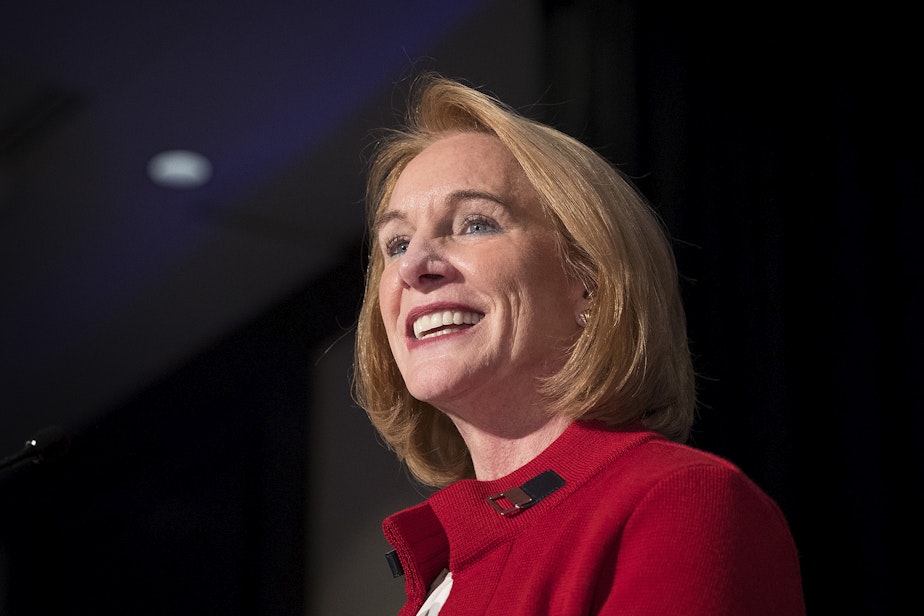Seattle Mayor Durkan: 'By the time there's a shooting, so much has gone wrong'

Seattle Mayor Jenny Durkan gave her annual State of the City address on Tuesday. She joined KUOW’s Paige Browning to talk about gun violence, the homelessness crisis, abusive teachers, and presidential politics.
This interview has been edited for length.
Paige Browning: A lot of people are talking about recent crime in Seattle, like the shooting downtown last month. You presented a new strategy on gun violence, involving a community response team. How would this work?
Jenny Durkan: So we are going to do a whole range of things, everything from community response to police response. The thing that you're talking about is we've seen a couple other cities have tried that when there is gang violence, if there is a shooting, while the police come and investigate and try to apprehend the person and hold them accountable, at the same time, you can dispatch trusted community people who will go to either the hotspot or other places in the community to try to de-escalate. We've seen in the Seattle region, when there is gang violence, it tends to create other violence. And so, for example, before the shootings downtown, there were shootings in Tukwila, some activity in Renton. It's really regional.
And so this is another method to make sure that we have a holistic response. It won't replace the other things we're going to be doing, which includes an increased police activity, some operations directed towards gang violence, but also the intervention and prevention upstream, because by the time there's a shooting, so much has gone wrong. We need to try to stop the violence and hold the people accountable.
Browning: The City Council is considering a business tax to pay for homeless services in Seattle. But you back state legislation that would let King County levy a broader tax. So what's happening here?
Sponsored
Durkan: So first, we don't know what Councilmember (Kshama) Sawant’s tax would look like because all she's talked about is how much she wants to raise. So we have no idea what that really looks like. But contrary to that, in Olympia, there is a concrete proposal that would be a progressive tax on businesses, and it would be geared toward those businesses that are employing people and paying them over $150,000 or more.
And those businesses themselves have come to the table and said, “We know that our prosperity and our great success has created these impacts and we want to be part of the solution.”
So there's a broad coalition of business and labor and housing activists and a whole range of stakeholders saying "how do we get a real solution and not just a fight?" I think it's really important that we actually make progress. And if I've learned anything in the last two years, is people have very little patience for just talk. They want to see action.
Browning: KUOW recently published an investigation showing that Seattle Public Schools allowed abusive teachers to remain in the classroom. I know you don't oversee schools, but you've got plenty of concerned parents in the city. Briefly, what would you say to them?
Durkan: Having that kind of transparency into our schools is very important. And the reporters who did that, I think, are a huge credit to our region.
Sponsored
I know that the Seattle school district is taking this very seriously. I've talked to a few of the school board members. I talked to the superintendent, and they want to work really hard to make sure that children are safe in our schools and that they are excelling. They know they have to make more concrete steps. They know that parents have to understand and know more. And they know that we have to have a system so that if there's teachers who have done things that are abusive to students, that there's more transparency ... and greater accountability.
Browning: Washington's presidential primary is coming up in a few weeks. Which candidate do you think would be best for Seattle?
Durkan: When I speak officially as mayor, I can't take political positions.
Browning: You can speak as a citizen, if you'd like.
Durkan: I know -- I'm taking off my hat as mayor right now. We're finally getting a primary, which we've never had before that counted. The results of the caucuses four years ago were very different than the results of the primary. So I think no one really knows what's going to happen.
Sponsored
I am not yet supporting any candidate. It's my hope that we are able to have a political race that actually can focus on the issues that are important to Americans and not just on hyperbole and fighting.





